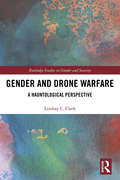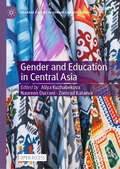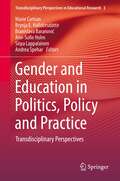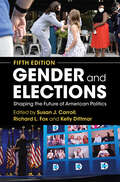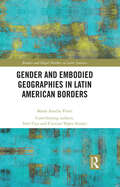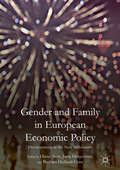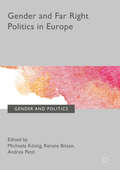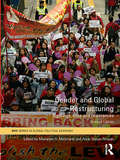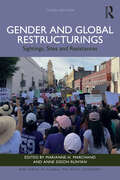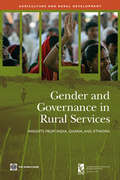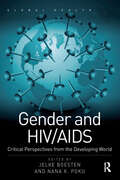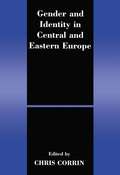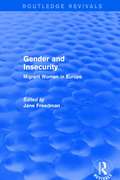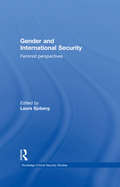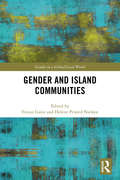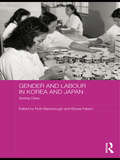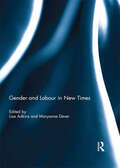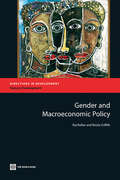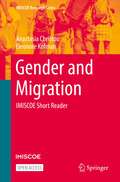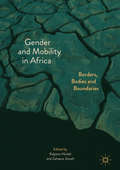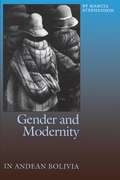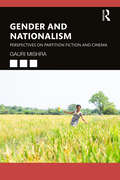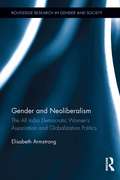- Table View
- List View
Gender and Drone Warfare: A Hauntological Perspective (Routledge Studies in Gender and Security)
by Lindsay C. ClarkThis book investigates how drone warfare is deeply gendered and how this can be explored through the methodological framework of ‘Haunting’. Utilising original interview data from British Reaper drone crews, the book analyses the way killing by drones complicates traditional understandings of masculinity and femininity in warfare. As their role does not include physical risk, drone crews have been critiqued for failing to meet the masculine requirements necessary to be considered ‘warriors’ and have been derided for feminising war. However, this book argues that drone warfare, and the experiences of the crews, exceeds the traditional masculine/feminine binary and suggests a new approach to explore this issue. The framework of Haunting presented here draws on the insights of Jacques Derrida, Avery Gordon, and others to highlight four key themes – complex personhood, in/(hyper)visibility, disturbed temporality and power – as frames through which the intersection of gender and drone warfare can be examined. This book argues that Haunting provides a framework for both revealing and destabilising gendered binaries of use for feminist security studies and International Relations scholars, as well as shedding light on British drone warfare. This book will be of interest to students of gender studies, sociology, war studies, and critical security studies.
Gender and Education in Central Asia (Palgrave Studies in Gender and Education)
by Naureen Durrani Aliya Kuzhabekova Zumrad KataevaThis open access book brings together established and emerging scholars to explore policies, statistical trends and representative research on gender equity across post-Soviet Central Asia. The book provides an overview of policy development in the promotion of gender equity, a comparative summary of changes in gender equity indicators at various levels of education, and examples of current research on an array of issues relating to gender equity across the region. The chapters present a broad picture which will be relevant to scholars of educational reform, comparative education policy, international development and gender issues.
Gender and Education in Politics, Policy and Practice: Transdisciplinary Perspectives (Transdisciplinary Perspectives in Educational Research #3)
by Andrea Spehar Marie Carlson Brynja E. Halldórsdóttir Branislava Baranović Ann-Sofie Holm Sirpa LappalainenThis book presents ideas on education, gender and intersectionality through a transdisciplinary frame by crossing disciplinary and methodological borders. Exploring the diversity of educational settings ranging from early childhood to adult education, it brings together scholars from various disciplines to discuss, deconstruct and problematize gender and education in relation to several themes in a comparative, intersectional, local, national, regional and international perspective. Each chapter approaches the topic in an intersectional and/or transnational manner and creates powerful gendered educational knowledge. Questions addressed in the book include: What are the challenges or barriers to gender-equal education? How can we understand the gaps between formal policies and educational practices? The chapters in the book illustrate how gender and education are relevant and needed concepts within the field of transdisciplinary research. The authors hail from a range of countries, such as Croatia, Indonesia, Turkey, UK, as well as the Nordic region, and they critically examine gender and education at all levels and in diverse sectors, and with varied lenses, such as neoliberalism in education, and the inclusion of newcomers and refugees. The work also critically investigates programs and pedagogical approaches, culture and values, knowledge and identity in teacher education. The book further addresses criticisms of Western and Anglophone bias around “white feminism” and the norm of white, male and heterosexual privilege.
Gender and Elections
by Richard L. Fox Susan J. CarrollThe new edition of this book describes the role of gender in the American electoral process through the 2008 elections. It strikes a balance between highlighting the most important developments for women as voters and candidates in the 2008 elections and providing a deeper analysis of the ways that gender has helped shape electoral politics in the United States. Individual chapters demonstrate the importance of gender in understanding presidential elections, voter participation and turnout, voting choices, the participation of African American women, congressional elections, the support of political parties and women's organizations, candidate communications with voters, and state elections. This updated volume also includes new chapters that analyze the roles of Latinas in U. S. politics and chronicle the candidacies of Hillary Clinton and Sarah Palin.
Gender and Elections
by Richard L. Fox Susan J. CarrollThe third edition of Gender and Elections offers a systematic, lively, and multifaceted account of the role of gender in the electoral process through the 2012 elections. This timely yet enduring volume strikes a balance between highlighting the most important developments for women as voters and candidates in the 2012 elections and providing a more long-term, in-depth analysis of the ways that gender has helped shape the contours and outcomes of electoral politics in the United States. Individual chapters demonstrate the importance of gender in understanding and interpreting presidential elections, presidential and vice-presidential candidacies, voter participation and turnout, voting choices, congressional elections, the political involvement of Latinas, the participation of African American women, the support of political parties and women's organizations, candidate communications with voters, and state elections. Without question, Gender and Elections is the most comprehensive, reliable, and trustworthy resource on the role of gender in US electoral politics.
Gender and Elections: Shaping the Future of American Politics
by Richard L. Fox Susan J. Carroll Kelly DittmarThe fifth edition of Gender and Elections offers a lively, multi-faceted account of the role of gender in the electoral process through the 2020 elections. This timely yet enduring volume strikes a balance between highlighting the most important developments for women as voters and candidates in the 2020 elections and providing an in-depth analysis of the ways that gender has helped shape the contours and outcomes of electoral politics in the United States. Individual chapters demonstrate the importance of gender in understanding presidential, congressional, and state elections; voter participation, turnout, and choices; participation of African American women and Latinas; support of political parties and women's organizations; and candidate communication. New chapters explore the role of social movements in elections and introduce concepts of gendered and raced institutions, intersectionality, and identity politics applied to presidential elections from past to present. The resulting volume is the most comprehensive and reliable resource on the role of gender in electoral politics.
Gender and Embodied Geographies in Latin American Borders (Borders and Illegal Markets in Latin America)
by Maria Amelia Viteri Iréri Ceja Cristina Yépez ArroyoGender and Embodied Geographies in Latin American Borders is the first study of its kind to bring a gender perspective to studies on violence and "illegal markets" in the region. Analyzing the structural problems that create inequality and enable gendered violence in Mexico, Guatemala, Colombia, Ecuador, Peru, Bolivia, Brazil and Argentina, the authors offer a critique of the securitization of borders and the criminalization of human mobility, and propose alternatives to reduce violence. Newspaper reports on gender and the variables of violence, human trafficking, people smuggling, missing persons, victims and perpetrators uncover the production and reproduction of discourses and images related to violence. Interviews with strategic actors from nongovernmental organizations, academia, as well as public policy makers diversify the experiences from the different voices of authority. Gender and Embodied Geographies in Latin American Borders encourages us to continue to question silence, impunity, the restriction of mobility, the dehumanization of securitization policies and the institutionalization of gender violence. A welcomed must read for scholars, researchers, policy makers, and students of gender studies, security studies and migration.
Gender and Family in European Economic Policy: Developments in the New Millennium
by Diana Auth Jutta Hergenhan Barbara Holland-CunzThis collection explores how pioneering gender equality policies have shaped women's economic presence in Europe since 2000. Equal pay policies, parental leave reforms, corporate quotas and electoral quotas have raised pressing questions about the effectiveness in promoting equal participation, as researchers quote both quantitative improvement in gender diversity and qualitative lag in cultural change. The chapters in this book present interlocking cross-national and cross-policy comparisons of the three most controversial reforms: equal pay, parental leave, and quotas for political representatives. The contributors address the cultural context in which reforms arose, internally contradictory policies, and the relative effectiveness of fast-track quotas and incentives compared to long-term efforts to change the overall culture of gender. This critical examination of the new millennium's groundbreaking gender policies will appeal to academics and practitioners interested in the progress of gender equality in the economic, political, and social welfare fields.
Gender and Far Right Politics in Europe
by Michaela Köttig Renate Bitzan Andrea PetöThis book is a systematic consideration of the link between the extreme right and the discourse about developments in regard to gender issues within different national states. The contributors analyze right-wing extremist tendencies in Europe under the specific perspective on gender. The volume brings together the few existing findings concerning the quantitative dimension of activities carried out by men and women in different countries, and illuminates and juxtaposes gender ratios along with the role of women in right-wing extremism. Along with the gender-specific access to right-wing groups, the chapters look at networks, organizational forms, specific strategies of female right-wing extremists, their ideologies (especially regarding femininity and masculinity), hetero normativity, discourses on sexuality, and preventive and counter-strategies. The book will be of use to students and scholars interested in gender and politics, European politics, and political extremism.
Gender and Global Restructuring: Sightings, Sites and Resistances (RIPE Series in Global Political Economy)
by Anne Sisson Runyan Marianne H. MarchandIn this new edition of this best selling text, interdisciplinary feminist experts from around the world provide new analyses of the ongoing relationship between gender and neoliberal globalization under the new imperialism in the post-9/11 context. Divided into Sightings, Sites and Resistances, this book examines: the disciplining politics of race, sexuality and modernity under securitized globalization, including case studies on domestic workers in Hong Kong heteronormative development policies and responses to the crisis of social reproduction and colonizing responses to AIDS in sub-Saharan Africa migration, human rights and citizenship, including studies on remittances, the emergence of neoliberal subjectivities among rural Mexican women, Filipina migrant workers and women’s labor organizing in the Middle East and North Africa feminist resistance, incorporating the latest scholarship on transnational feminism and feminist critical globalization movement activism, including case studies on men’s violence on the Mexico/US border, pan-indigenous women’s movements and cyberfeminism. Providing a coherent and challenging approach to the issues of gender and the processes of globalization in the new millennium, this important text will be of interest to students and scholars of IPE, international relations, economics, development and gender studies.
Gender and Global Restructurings: Sightings, Sites and Resistances (RIPE Series in Global Political Economy)
by Marianne H. MarchandIn the new edition of this bestselling text and scholarly reference, new and revised chapters reflect shifts in the gendered, classed, racialized and sexualized nature of ongoing global restructurings.Through fresh intersectional feminist analyses of widening health, climate, care, inequality, democracy and knowledge crises since the Great Financial Crisis and the deepening of many forms of capitalism, this volume stresses the complexities of multiple restructurings which demand new ways to think across sightings, sites and resistances. Some of each of these elements are in every chapter, which take the reader to different sightings, such as of neoliberalizations, neoauthoritarianizations, multipolarizations, financializations and migrations. They also bring into view different geographic sites, such as Hong Kong, sub-Saharan and North Africa, Canada, Mexico, Bangladesh and the trade blocs of the European Union and the BRICs, and different nongeographic sites such as productive and reproductive economies and the virtual economy of finance and digitalization. They further highlight different forms of women’s and feminist resistance, such as local and national labor organizing, regional and multipolar organizing, reimagining infrastructure design and broadening noncapitalist community and solidarity economies. Many chapters critique problematic constructions of women’s empowerment, and all challenge the machinations of neoliberal capital that undermine most women, marginalized peoples and the planet.Providing a coherent and challenging approach to contemporary gendered globalization, better understood as global restructurings, since the last edition over a decade ago, Gender and Global Restructurings will be of interest to students and scholars of international political economy, international relations, economics, development and gender studies.
Gender and Governance in Rural Services
by The World Bank International Food Policy Research Insti'Gender and Governance in Rural Services' provides policy-relevant knowledge on strategies to improve agricultural and rural service delivery with a focus on providing more equitable access to these services, especially for women. It focuses India, Ethiopia, and Ghana, and focuses on two public services: agricultural extension, as an example of an agricultural service, and on drinking water, as an example of rural service that is not directly related to agriculture but is of high relevance for rural women. It provides empirical microlevel evidence on how different accountability mechanisms for agricultural advisory services and drinking water provision work in practice, and analyzes factors that influence the suitability of different governance reform strategies that aim at making service provision more gender responsive. It presents major findings from the quantitative and qualitative research conducted under the project in the three countries, which are analyzed in a qualitative way to identify major patterns of accountability routes in agricultural and rural service provision and to assess their gender dimension. The book is intended for use by a wide audience interested in agricultural and rural service provision, including researchers, members of the public administration, policy makers, and staff from nongovernmental organizations (NGOs) and international development agencies who are involved in the design and management of reform efforts, projects, and programs dealing with rural service provision.
Gender and HIV/AIDS: Critical Perspectives from the Developing World (Routledge Global Health Series)
by Nana K. PokuGender issues are central to the causes and impact of the ongoing AIDS epidemic. The editors bring together cutting edge contemporary scholarship on gender and AIDS in one volume. They address questions related to gender and sexuality, how women and men live the epidemic differently and how such differences lead to different outcomes. The volume joins research on Africa, Asia and Latin America and illustrates how the epidemic has different gendered characteristics, causes and consequences in different regions. Collectively, the chapters demonstrate the fundamental ways that gender influences the spread of the disease, its impact and the success of prevention efforts. This scholarly, interdisciplinary volume provides a comprehensive introduction to the themes and issues of gender, AIDS and global public health and informs students, policy makers and practitioners of the complexity of the gendered nature of AIDS.
Gender and Identity in Central and Eastern Europe
by Chris CorrinThis collection highlights changes in Central and Eastern Europe since 1989 from the perspectives of gender and identity. Resistance to the negative consequences of certain changes demonstrate that women's activities have played a large part in democratic developments in various countries.
Gender and Insecurity: Migrant Women in Europe (Critical Security Ser.)
by Jane FreedmanThis title was first published in 2003. Migration is a phenomenon which is at the heart of global politics and, within the EU, governments are continually trying to reinforce their controls of migration. These controls, designed to increase the security of European populations may, however, have the adverse effect of increasing the insecurity of migrants. This is particularly true for the many women who migrate to Europe and find themselves in insecure positions because of their lack of independent legal status, the difficulty of access to adequate health and social security provision and their particular vulnerability to both domestic and institutional forms of violence. They are often in economically weak positions, either unemployed or in badly paid part-time or domestic jobs with no forms of social protection. Gender and Insecurity addresses these various forms of insecurity and details ways in which they might be addressed. Further, it looks at the ways in which immigrant women have themselves tried to fight against these insecurities through their own political mobilisation.
Gender and International Security: Feminist Perspectives (Routledge Critical Security Studies #17)
by Laura SjobergThis book defines the relationship between gender and international security, analyzing and critiquing international security theory and practice from a gendered perspective. Gender issues have an important place in the international security landscape, but have been neglected both in the theory and practice of international security. The passage and implementation of UN Security Council Resolution 1325 (on Security Council operations), the integration of gender concerns into peacekeeping, the management of refugees, post-conflict disarmament and reintegration and protection for non-combatants in times of war shows the increasing importance of gender sensitivity for actors on all fronts in global security. This book aims to improve the quality and quantity of conversations between feminist security studies and security studies more generally, in order to demonstrate the importance of gender analysis to the study of international security, and to expand the feminist research program in Security Studies. The chapters included in this book not only challenge the assumed irrelevance of gender, they argue that gender is not a subsection of security studies to be compartmentalized or briefly considered as a side issue. Rather, the contributors argue that gender is conceptually, empirically, and normatively essential to studying international security. They do so by critiquing and reconstructing key concepts of and theories in international security, by looking for the increasingly complex roles women play as security actors, and by looking at various contemporary security issues through gendered lenses. Together, these chapters make the case that accurate, rigorous, and ethical scholarship of international security cannot be produced without taking account of women's presence in or the gendering of world politics. This book will be of interest to all students of critical security studies, gender studies and International Relations in general. Laura Sjoberg is Assistant Professor of Political Science at the University of Florida. She has a Phd in International Relations and Gender Studies from the University of Southern California and is the author of Gender, Justice, and the Wars in Iraq (2006) and, with Caron Gentry, Mothers, Monsters, Whores: Women's Violence in Global Politics (2007)
Gender and Island Communities (Gender in a Global/Local World)
by Helene Pristed Nielsen Firouz GainiThis book takes an explicitly feminist approach to studying gender and social inequalities in island settings while deliberating on ‘islandness’ as part of the intersectional analysis. Though there is a wealth of recent literature on islands and island studies, most of this literature focuses on islands as objects of study rather than as contexts for exploring gender relations and local gendered developments. Taking Karides’ ‘Island feminism’ as a starting point and drawing from the wider literature on island studies as well as gender and place, this book bridges this gap by exploring gender, gender relations, affect and politics in various island settings spanning a great variety of global locations, from the Faroe Islands and Greenland in the north to Tasmania in south. Insights on recent developments and gendered contestations in these locations provide rich food for thought on the intricate links between gender and place in a local/global world. This text will be of key interest to students and scholars of gender and feminist studies, cultural studies, Island studies, anthropology, and more broadly to sociology, geography, diversity and social justice studies, global democracy, and international relations.
Gender and Labour in Korea and Japan: Sexing Class (ASAA Women in Asia Series)
by Elyssa Faison Ruth BarracloughBringing together for the first time sexual and industrial labour as the means to understand gender, work and class in modern Japan and Korea, this book shows that a key feature of the industrialisation of these countries was the associated development of a modern sex labour industry. Tying industrial and sexual labour together, the book opens up a range of key questions: In what economy do we place the labour of the former "comfort women"? Why have sex workers not been part of the labour movements of Korea and Japan? Why is it difficult to be "working-class" and "feminine"? What sort of labour hierarchies operate in hostess clubs? How do financial crises translate into gender crises? This book explores how sexuality is inscribed in working-class identities and traces the ways in which sexual and labour relations have shaped the cultures of contemporary Japan and Korea. It addresses important historical episodes such as the Japanese colonial industrialisation of Korea, wartime labour mobilisation, women engaged in forced sex work for the Japanese army throughout the Asian continent, and issues of ethnicity and sex in the contemporary workplace. The case studies provide specific examples of the way gender and work have operated across a variety of contexts, including Korean shipyard unions, Japanese hostess clubs, and the autobiographical literature of Korean factory girls. Overall, this book provides a compelling account of the entanglement of sexual and industrial labour throughout the twentieth century, and shows clearly how ideas about gender have contributed in fundamental ways to conceptions of class and worker identities.
Gender and Labour in New Times
by Lisa Adkins and Maryanne DeverThis book is concerned with the gender order of post-Fordism, and especially the labour demanded from many women by post-Fordist capitalism. It maps and traces these demands as well their entanglement in complex processes of value creation. In so doing the contributors elaborate how processes of financialization; calls for work-readiness; new modes of economic calculation; processes of economization, and emergent regulatory strategies are reconfiguring labour and life in post-Fordism and summoning new forms of ‘women’s work’. Contributors also map how these same processes are repositioning feminism, especially feminism as a mode of critique. Feminism here stands not in an external relation to the objects and matters it seeks to critique but as implicated in those very objects. In mapping this terrain Gender and Labour in New Times opens out new feminist research agendas for the study of the post-Fordist labour and the modes of regulation that post-Fordism as a regime of capital accumulation entails. This book was originally published as a special issue of Australian Feminist Studies.
Gender and Macroeconomic Policy
by Raj Nallari Breda GriffithMainstream economic analysis has traditionally overlooked gender. The individual-the basic category of analysis-was regarded as genderless. Neither gender discrimination nor segmentation and segregation within the labor market or within the household was present. Contributions from development theory, new household economics (NHE), labor economics, and feminist analysis have done much to change this. Focusing on gender equality-by which we mean equality in opportunity, inputs, and outcome-has yielded important insights for the growth and development of an economy. But we are still at the cusp. While there have been huge improvements in recognizing gender as an analytical category at the microeconomic level, the macroeconomic implications of gender equality remain undeveloped. Engendering macroeconomics is an important and valid research and policy area. Over the past three decades, economic development has generally affected women differently than men in the developing world. At the same time, gender relations have affected macroeconomic outcomes. This volume examines the research and policy implications of engendering macroeconomic policy.
Gender and Migration: IMISCOE Short Reader (IMISCOE Research Series)
by Eleonore Kofman Anastasia ChristouThis open access short reader offers a critical review of the debates on the transformation of migration and gendered mobilities primarily in Europe, though also engaging in wider theoretical insights. Building on empirical case studies and grounded in an analytical framework that incorporates both men and women, masculinities, sexualities and wider intersectional insights, this reader provides an accessible overview of conceptual developments and methodological shifts and their implications for a gendered understanding of migration in the past 30 years. It explores different and emerging approaches in major areas, such as: gendered labour markets across diverse sectors beyond domestic and care work to include skilled sectors of social reproduction; the significance of families in migration and transnational families; displacement, asylum and refugees and the incorporation of gender and sexuality in asylum determination; academic critiques and gendered discourses concerning integration often with the focus on Muslim women. The reader concludes with considerations of the potential impact of three notable developments on gendered migrations and mobilities: Black Lives Matter, Brexit and COVID-19. As such, it is a valuable resource for students, academics, policy makers, and practitioners.
Gender and Mobility in Africa: Borders, Bodies and Boundaries
by Kalpana Hiralal Zaheera JinnahThis volume examines gender and mobility in Africa though the central themes of borders, bodies and identity. It explores perceptions and engagements around ‘borders’; the ways in which ‘bodies’ and women’s bodies in particular, shape and are affected by mobility, and the making and reproduction of actual and perceived ‘boundaries’; in relation to gender norms and gendered identify. Over fourteen original chapters it makes revealing contributions to the field of migration and gender studies. Combining historical and contemporary perspectives on mobility in Africa, this project contextualises migration within a broad historical framework, creating a conceptual and narrative framework that resists post-colonial boundaries of thought on the subject matter. This multidisciplinary work uses divergent methodologies including ethnography, archival data collection, life histories and narratives and multi-country survey level data and engages with a range of conceptual frameworks to examine the complex forms and outcomes of mobility on the continent today. Contributions include a range of case studies from across the continent, which relate either conceptually or methodologically to the central question of gender identity and relations within migratory frameworks in Africa. This book will appeal to researchers and scholars of politics, history, anthropology, sociology and international relations.
Gender and Modernity in Andean Bolivia
by Marcia StephensonIn Andean Bolivia, racial and cultural differences are most visibly marked on women, who often still wear native dress and speak an indigenous language rather than Spanish. In this study of modernity in Bolivia, Marcia Stephenson explores how the state's desire for a racially and culturally homogenous society has been deployed through images of womanhood that promote the notion of an idealized, acculturated female body.<P><P>Stephenson engages a variety of texts-critical essays, novels, indigenous testimonials, education manuals, self-help pamphlets, and position papers of diverse women's organizations-to analyze how the interlocking tropes of fashion, motherhood, domestication, hygiene, and hunger are used as tools for the production of dominant, racialized ideologies of womanhood. At the same time, she also uncovers long-standing patterns of resistance to the modernizing impulse, especially in the large-scale mobilization of indigenous peoples who have made it clear that they will negotiate the terms of modernity, but always "as Indians."
Gender and Nationalism: Perspectives on Partition Fiction and Cinema
by Gauri MishraThis book studies negotiations of gender politics in the process of nation formation in the aftermath of the Partition. One of the most traumatic events in South Asian history, the Partition forms the basis of numerous literary and cinematic interpretations. Drawing on Hindi, English, Urdu and Punjabi fiction, it shows how gender is irrevocably woven into the idea of the nation and the politics of it. It focuses on the works of Saadat Hasan Manto, Rajinder Singh Bedi, Ismat Chughtai, Yashpal, Khushwant Singh, Abdullah Hussein, Mumtaz Shah Nawaz and Attia Hosain to delve into the horrors of the Partition, toward women in particular, and their representations in literary and cinematic imaginations. As an important contribution to the study of the Partition of India, this volume will be of great interest to scholars and researchers of literature, culture studies, film studies, politics, gender studies and South Asian studies. .
Gender and Neoliberalism: The All India Democratic Women’s Association and Globalization Politics (Routledge Research in Gender and Society)
by Elisabeth ArmstrongThis book describes the changing landscape of women’s politics for equality and liberation during the rise of neoliberalism in India. Between 1991 and 2006, the doctrine of liberalization guided Indian politics and economic policy. These neoliberal measures vastly reduced poverty alleviation schemes, price supports for poor farmers, and opened India’s economy to the unpredictability of global financial fluctuations. During this same period, the All India Democratic Women’s Association, which directly opposed the ascendance of neoliberal economics and policies, as well as the simultaneous rise of violent casteism and anti-Muslim communalism, grew from roughly three million members to over ten million. Beginning in the late 1980s, AIDWA turned its attention to women’s lives in rural India. Using a method that began with activist research, the organization developed a sectoral analysis of groups of women who were hardest hit in the new neoliberal order, including Muslim women, and Dalit (oppressed caste) women. AIDWA developed what leaders called inter-sectoral organizing, that centered the demands of the most vulnerable women into the heart of its campaigns and its ideology for social change. Through long-term ethnographic research, predominantly in the northern state of Haryana and the southern state of Tamil Nadu, this book shows how a socialist women’s organization built its oppositional strength by organizing the women most marginalized by neoliberal policies and economics.
